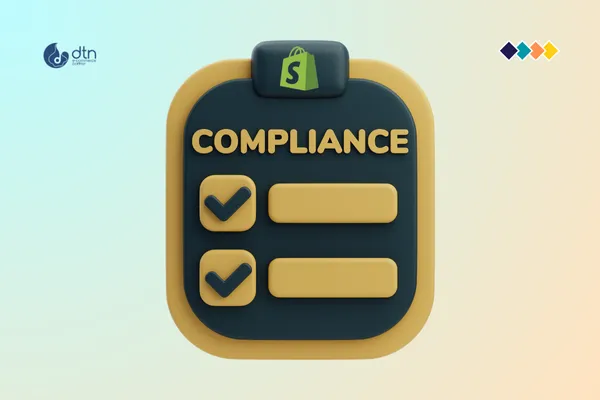While Shopify offers a robust platform for creating and managing online stores, it’s essential to prioritize legal compliance amid its user-friendly features. Neglecting legal obligations can lead to hefty fines, damage to your reputation, and even the risk of business closure. This guide outlines the fundamental legal areas to consider when selling your products or services on Shopify. Remember, this information is not a substitute for professional legal advice—consult a qualified legal expert for your specific situation.
Table of Contents
1. General Business Compliance
Before launching your Shopify store, it’s crucial to establish a solid foundation in general business compliance, which includes:
- Business Structure: Selecting the appropriate legal structure for your business (such as sole proprietorship, partnership, LLC, or corporation) will affect your liability, taxes, and administrative responsibilities. The chosen structure determines your registration requirements and ongoing compliance needs.
- Registration & Licensing: Depending on your location, industry, and business type, you may need to register your business name, acquire necessary licenses and permits (like sales tax permits and business licenses), and possibly register with relevant professional organizations. Failing to do so could result in substantial penalties.
- Tax Responsibilities: Familiarize yourself with your tax obligations at local, state, and federal levels. This includes sales tax, income tax, and potentially other taxes based on your industry and location. Although Shopify offers some integration with tax calculation tools, you remain responsible for accurate and timely tax filings.
- Insurance: It’s essential to protect your business with appropriate insurance coverage. This could include general liability insurance, product liability insurance (especially for physical products), professional liability insurance, and workers’ compensation insurance (if you have employees).

2. Shopify-Specific Compliance
Shopify provides various tools and resources, but you must ensure adherence to all relevant laws. Key areas include:
- Terms of Service: Familiarize yourself with Shopify’s Terms of Service, as breaching these can lead to account suspension or termination.
- Privacy Policy: A well-crafted privacy policy is vital, especially with the rise of data protection regulations such as GDPR (General Data Protection Regulation) and CCPA (California Consumer Privacy Act). Your policy should clearly outline how you collect, use, and safeguard customer data. While Shopify offers templates, customize them to reflect your practices accurately.
- Cookie Policy: If your store uses cookies, you need a separate cookie policy detailing the cookies employed, their purpose, and how users can manage their preferences. This can be integrated with your privacy policy.
- Shipping & Returns: Clearly communicate your shipping policies, including costs, delivery times, and procedures for handling damaged or lost goods. Your return policy should be equally transparent and comply with regional consumer protection laws to avoid disputes.
- Payment Processing Compliance: If you accept online payments, ensure compliance with the Payment Card Industry Data Security Standards (PCI DSS) to protect sensitive customer data. Shopify provides resources to assist with PCI compliance, but the ultimate responsibility lies with you.
- Accessibility Compliance: Make sure your website is accessible to individuals with disabilities, adhering to laws like the Americans with Disabilities Act (ADA) in the U.S. This requires appropriate website design and functionality to accommodate users with visual, auditory, motor, or cognitive impairments.

3. Product-Specific Compliance
Legal requirements for your products will differ significantly based on what you sell:
- Product Safety: If you’re selling physical items, ensure they comply with relevant safety standards and regulations. This may include certifications, labeling requirements, and adherence to specific industry standards. Non-compliance can lead to product recalls and legal action.
- Intellectual Property: Verify that you have the right to sell your products and avoid infringing on trademarks, copyrights, or patents. Conduct thorough checks on your suppliers and ensure you have the necessary licenses or permissions.
- Consumer Protection Laws: Various laws govern advertising, pricing, product descriptions, and warranties. Avoid making false or misleading claims, and ensure your product descriptions are accurate.
- Import/Export Regulations: If you sell internationally, you must comply with both your home country’s and your customers’ countries’ import and export regulations. This includes customs duties, tariffs, and other regulatory requirements.

4. Content Compliance
The content on your Shopify store must also meet legal standards:
- Advertising Laws: Your marketing materials should be truthful, accurate, and not misleading. Avoid making unsupported claims or using deceptive practices.
- Data Protection Laws (GDPR, CCPA, etc.): As previously mentioned, comply with data protection laws by obtaining consent for data collection, ensuring data security, and providing users control over their data.
- Copyright & Intellectual Property: Ensure you have the rights to use any images, videos, or other content on your store. Avoid copyright infringement and attribute copyrighted materials appropriately.

5. Staying Informed
Legal regulations are constantly evolving, making it vital to stay informed:
- Regularly review your policies and procedures.
- Subscribe to updates relevant to your industry and location.
- Consult legal counsel periodically.
Disclaimer: This article provides general information about legal compliance on Shopify and should not be considered legal advice. It’s essential to seek guidance from a qualified legal professional to ensure your business adheres to all applicable laws and regulations in your jurisdiction. Non-compliance can result in serious consequences, so proactive compliance is essential for the success and longevity of your Shopify store.
Frequently Asked Questions
We’ve compiled a list of answers to common questions.
What essential compliance steps should I take before starting my Shopify store?
Establish the right business structure (e.g., LLC or corporation), register your business with local authorities, obtain necessary licenses and permits, and meet all tax obligations, including sales tax registration. Don’t forget to secure the appropriate business insurance.
How can I ensure compliance with data protection laws like GDPR and CCPA?
Create a comprehensive privacy policy that details how you collect, store, and use customer data. Ensure your store has clear mechanisms for cookie consent and allows users to manage their data preferences. While Shopify provides tools, tailor your policies to your specific practices and jurisdiction.
What should I include in my shipping and return policies to avoid legal issues?
Ensure your policies are clear and detailed, covering shipping costs, delivery times, handling of lost or damaged goods, and return conditions. Adhere to consumer protection laws to minimize disputes and foster customer trust.
How can I protect my Shopify store from intellectual property violations?
Confirm that you have the rights to sell the products and use the images and content on your website. Avoid infringing on trademarks, copyrights, or patents. Vet your suppliers thoroughly and obtain necessary licenses or permissions for any materials you utilize.
What steps can I take to stay current with changing legal requirements for my Shopify store?
Regularly review and update your store’s policies, subscribe to relevant industry and legal updates, and consult with legal experts to ensure your business adapts to changes in laws and regulations.



